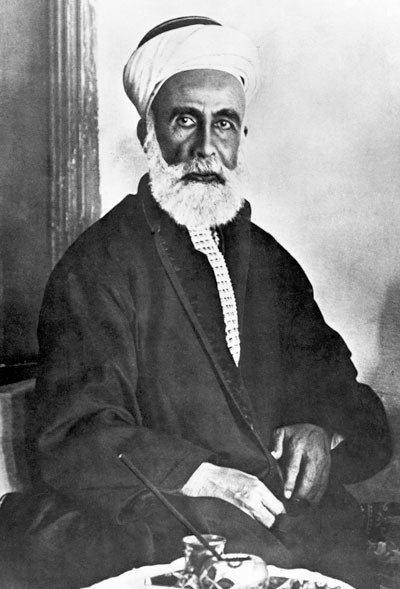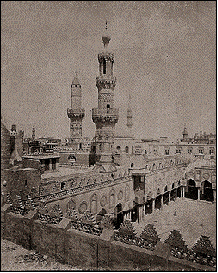|
Muhibb-ud-Deen Al-Khatib
Muhibb ud-Din al-Khateeb (or Muhibb al-Din al-Khatib) (died 1969) was a Syrian Salafi writer. He was the maternal uncle of Ali al-Tantawi and was the author of the "hate filled" anti-Shia pamphlet entitled ''al-Khutoot al-‘Areedah'' (The broad lines of the foundations upon which the religion of the Imami Twelver Shiites is based). He has been described as "one of the most influential anti-Shiite polemicists of the twentieth century."Maréchal & Zemni 2013, p.105 In 1916, he was made the editor of ''Al Qibla'', the official newspaper of Sharif Hussein. See also *Criticism of Twelver Shi'ism Criticism of Twelver Shia Islam dates from the initial ideological rift among early Muslims that led to the two primary denominations of Islam, the Sunnis and the Shias. The question of succession to Muhammad in Islam, the nature of the Imam ... * Shi'a–Sunni relations References External linksal-Qibla Bibliography * {{Authority control Egyptian journalists Egyptian academics ... [...More Info...] [...Related Items...] OR: [Wikipedia] [Google] [Baidu] |
Al Qibla
''Al Qibla'' (Arabic: ''direction of Mecca'') was the official gazette of the Kingdom of Hejaz. It was in circulation between 1916 and 1924 and headquartered in Mecca. The paper was a four-page broadsheet and published twice a week, on Mondays and on Thursdays. The slogan of ''Al Qibla'' was the following verse taken from Quran: And We did not make the qibla which you used to face except that We might make evident who would follow the Messenger from those who would turn on their heels. History and profile ''Al Qibla'' was first published on 15 August 1916, five weeks after the capture of Mecca by Sharif Hussein. The founders of the paper were Muhib Al Din Al Khatib and Fuad Al Khatib. It was published by Wilāya Press in Mecca on a semi-weekly basis. Muhib Al Din Al Khatib was also its founding editor-in-chief. Tayeb Al Sassi also served in the post. The paper featured international news based on the official communiques from Cairo, local news and writings of leading Arabic writ ... [...More Info...] [...Related Items...] OR: [Wikipedia] [Google] [Baidu] |
Hussein Bin Ali, Sharif Of Mecca
Hussein bin Ali al-Hashimi ( ar, الحسين بن علي الهاشمي, al-Ḥusayn bin ‘Alī al-Hāshimī; 1 May 18544 June 1931) was an Arab leader from the Banu Hashim clan who was the Sharif and Emir of Mecca from 1908 and, after proclaiming the Great Arab Revolt against the Ottoman Empire, King of the Hejaz from 1916 to 1924 and Caliphate, Caliph from 1924 to 1925. After the Abolition of the Caliphate, abolition of the Ottoman Caliphate he was briefly proclaimed Sharifian Caliph, Caliph until the invasion of the Hejaz by the Saudis the following year. He was a Hashemites#Ancestry, 37th-generation direct descendant of Muhammad, as he belonged to the Hashemite family. A member of the Dhawu Awn clan of the Qatadid emirs of Mecca, he was perceived to have rebellious inclinations and in 1893 was summoned to Istanbul, where he was kept on the Council of State. In 1908, in the aftermath of the Young Turk Revolution, he was appointed Emir of Mecca by the List of sultans of th ... [...More Info...] [...Related Items...] OR: [Wikipedia] [Google] [Baidu] |
Criticism Of Twelver Shi'ism
Criticism of Twelver Shia Islam dates from the initial ideological rift among early Muslims that led to the two primary denominations of Islam, the Sunnis and the Shias. The question of succession to Muhammad in Islam, the nature of the Imamate, the status of the twelfth Shia Imam, and other areas in which Shia Islam differs from Sunni Islam have been criticized by Sunni scholars, even though there is no disagreement between the two sects regarding the centrality of the Quran, Muhammad, and many other doctrinal, theological and ritual matters. Shia commentators such as Musa al-Musawi and Ali Shariati have themselves, in their attempts to reform the faith, criticized practices and beliefs which have become prevalent in the Twelver Shia community. Image veneration Sunnis are particularly critical of the "love of visual imagery evident in Shia popular devotionalism" and regularly cite this characteristic (often referred to as 'Shia iconography') as proof of Shia deviance or ... [...More Info...] [...Related Items...] OR: [Wikipedia] [Google] [Baidu] |
Egyptian Journalists
Egyptian describes something of, from, or related to Egypt. Egyptian or Egyptians may refer to: Nations and ethnic groups * Egyptians, a national group in North Africa ** Egyptian culture, a complex and stable culture with thousands of years of recorded history ** Egyptian cuisine, the local culinary traditions of Egypt * Egypt, the modern country in northeastern Africa ** Egyptian Arabic, the language spoken in contemporary Egypt ** A citizen of Egypt; see Demographics of Egypt * Ancient Egypt, a civilization from c. 3200 BC to 343 BC ** Ancient Egyptians, ethnic people of ancient Egypt ** Ancient Egyptian architecture, the architectural structure style ** Ancient Egyptian cuisine, the cuisine of ancient Egypt ** Egyptian language, the oldest known language of Egypt and a branch of the Afroasiatic language family * Copts, the ethnic Egyptian Christian minority ** Coptic language or Coptic Egyptian, the latest stage of the Egyptian language, spoken in Egypt until the 17th centur ... [...More Info...] [...Related Items...] OR: [Wikipedia] [Google] [Baidu] |
Egyptian Academics
Egyptian describes something of, from, or related to Egypt. Egyptian or Egyptians may refer to: Nations and ethnic groups * Egyptians, a national group in North Africa ** Egyptian culture, a complex and stable culture with thousands of years of recorded history ** Egyptian cuisine, the local culinary traditions of Egypt * Egypt, the modern country in northeastern Africa ** Egyptian Arabic, the language spoken in contemporary Egypt ** A citizen of Egypt; see Demographics of Egypt * Ancient Egypt, a civilization from c. 3200 BC to 343 BC ** Ancient Egyptians, ethnic people of ancient Egypt ** Ancient Egyptian architecture, the architectural structure style ** Ancient Egyptian cuisine, the cuisine of ancient Egypt ** Egyptian language, the oldest known language of Egypt and a branch of the Afroasiatic language family * Copts, the ethnic Egyptian Christian minority ** Coptic language or Coptic Egyptian, the latest stage of the Egyptian language, spoken in Egypt until the 17th centur ... [...More Info...] [...Related Items...] OR: [Wikipedia] [Google] [Baidu] |
Egyptian Scholars
Egyptian describes something of, from, or related to Egypt. Egyptian or Egyptians may refer to: Nations and ethnic groups * Egyptians, a national group in North Africa ** Egyptian culture, a complex and stable culture with thousands of years of recorded history ** Egyptian cuisine, the local culinary traditions of Egypt * Egypt, the modern country in northeastern Africa ** Egyptian Arabic, the language spoken in contemporary Egypt ** A citizen of Egypt; see Demographics of Egypt * Ancient Egypt, a civilization from c. 3200 BC to 343 BC ** Ancient Egyptians, ethnic people of ancient Egypt ** Ancient Egyptian architecture, the architectural structure style ** Ancient Egyptian cuisine, the cuisine of ancient Egypt ** Egyptian language, the oldest known language of Egypt and a branch of the Afroasiatic language family * Copts, the ethnic Egyptian Christian minority ** Coptic language or Coptic Egyptian, the latest stage of the Egyptian language, spoken in Egypt until the 17th centur ... [...More Info...] [...Related Items...] OR: [Wikipedia] [Google] [Baidu] |
Egyptian Muslims
Islam is the dominant religion in Egypt (Arabic: مِصر, romanized: Miṣr) with around an estimated 90.3% of the population. Almost the entirety of Egypt's Muslims are Sunnis, with a very small minority of Shia.Islam has been recognized as the state religion since 1980. Since there has been no religious census, the actual percentage of Muslims is not known: the percentage of Christians are estimated to be between 5 and 15%. Prior to Napoleon's invasion in 1798, almost all of Egypt's educational, legal, public health, and social welfare issues were in the hands of religious functionaries. Ottoman rule reinforced the public and political roles of the ulama (religious scholars), as Mamluk rule had done before the Ottomans, because Islam was the state religion and because political divisions in the country were based on religious divisions. See drop-down essay on "Islamic Conquest and the Ottoman Empire" During the 19th and 20th centuries, successive governments made extensiv ... [...More Info...] [...Related Items...] OR: [Wikipedia] [Google] [Baidu] |
Egyptian Sunni Muslims
Egyptian describes something of, from, or related to Egypt. Egyptian or Egyptians may refer to: Nations and ethnic groups * Egyptians, a national group in North Africa ** Egyptian culture, a complex and stable culture with thousands of years of recorded history ** Egyptian cuisine, the local culinary traditions of Egypt * Egypt, the modern country in northeastern Africa ** Egyptian Arabic, the language spoken in contemporary Egypt ** A citizen of Egypt; see Demographics of Egypt * Ancient Egypt, a civilization from c. 3200 BC to 343 BC ** Ancient Egyptians, ethnic people of ancient Egypt ** Ancient Egyptian architecture, the architectural structure style ** Ancient Egyptian cuisine, the cuisine of ancient Egypt ** Egyptian language, the oldest known language of Egypt and a branch of the Afroasiatic language family * Copts, the ethnic Egyptian Christian minority ** Coptic language or Coptic Egyptian, the latest stage of the Egyptian language, spoken in Egypt until the 17th centur ... [...More Info...] [...Related Items...] OR: [Wikipedia] [Google] [Baidu] |
Critics Of Shia Islam
A critic is a person who communicates an assessment and an opinion of various forms of creative works such as art, literature, music, cinema, theater, fashion, architecture, and food. Critics may also take as their subject social or government policy. Critical judgments, whether derived from critical thinking or not, weigh up a range of factors, including an assessment of the extent to which the item under review achieves its purpose and its creator's intention and a knowledge of its context. They may also include a positive or negative personal response. Characteristics of a good critic are articulateness, preferably having the ability to use language with a high level of appeal and skill. Sympathy, sensitivity and insight are important too. Form, style and medium are all considered by the critic. In architecture and food criticism, the item's function, value and cost may be added components. Critics are publicly accepted and, to a significant degree, followed because of th ... [...More Info...] [...Related Items...] OR: [Wikipedia] [Google] [Baidu] |


